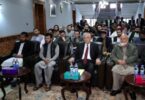KABUL (Khaama Press): A group of British Parliament members has initiated an inquiry into the status of women and girls in Afghanistan and Iran, titled “Gender Apartheid Investigations.”
This parliamentary group is currently gathering evidence and documents regarding the situation of women and girls in Afghanistan and Iran.
Forbes magazine reported on Tuesday that this investigation marks the world’s first comprehensive examination of the status of women and girls in Afghanistan and Iran, evaluating it against existing international legal definitions of international crimes.
The investigation is led by Helena Kennedy QC, a member of the House of Lords in Britain, and the group is examining the concept of “gender apartheid” and its compatibility with the existing international legal framework.
These representatives argue that gender apartheid is not an “international crime” and, according to the “Rome Statute,” apartheid refers to “inhumane acts of a character similar to other crimes against humanity committed in the context of an institutionalized regime of systematic oppression and domination by one racial group over any other racial group.”
This statute places gender-based sexual violence under the umbrella of crimes against humanity, stating: “Gender means the two sexes, male and female, within the context of society.”
Previously, Richard Bennett, the UN Special Rapporteur on Human Rights, stated in June that “severe and systematic discrimination” against women in Afghanistan could be seen as gender apartheid.
He emphasized during a Human Rights Council session that gender-based discrimination is at the core of the Taliban’s ideology.
Regarding the human rights situation in Afghanistan, he said, “Systematic discrimination, oppression, and separation of women and girls in Afghanistan require further examination in light of the current situation.”
UN experts warn that the Taliban’s treatment of Afghan women and girls may constitute crimes against humanity. They call for an investigation and prosecution of these limitations as sexual harassment under international law.
Meanwhile, Joanna Cherry, a representative of the Scottish National Party, stated in an article some time ago that the situation of women in Afghanistan and Iran is a clear case of gender apartheid and should be officially recognized in these two countries. She emphasized that Britain should take a leading role in addressing this issue.
Over the past two years, the Taliban has imposed extensive restrictions on women in Afghanistan. They have closed girls’ schools beyond the sixth grade and prohibited women from attending universities, working, engaging in recreational activities, traveling, participating in sports, and dining at restaurants.







